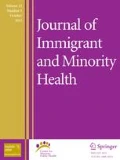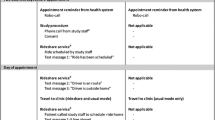Abstract
Transportation barriers can limit access to healthcare for refugee and asylum seeking women. This study assesses the efficacy of a healthcare-directed rideshare application for overcoming these barriers at an urban health clinic. A pilot study was conducted at Boston Medical Center’s Refugee Women’s Health Clinic from June 2018 to February 2019. Women with gynecologic visits reporting transportation difficulties were offered rides. The primary outcome was no-show rates. Secondary outcomes included cost, and patient/provider experiences. Of 102 eligible visits, 31 reported transportation insecurity and received rides. Those women had a 6% no-show rate, compared to 30% in women denying transportation barriers, and 50% amongst unreachable women (p < 0.0001). The intervention cost $2033 and generated $30,337 in charges. Minimal adverse experiences were reported. Healthcare-directed rideshare applications are an effective and cost-efficient strategy for refugee and asylum seeking women to access essential health services.

Similar content being viewed by others
References
Eckstein B. Primary care for refugees. Am Fam Physician. 2011;83(4):429–36.
Efird JT, Bith-Melander P. Refugee health: an ongoing commitment and challenge. Int J Environ Res Public Health. 2018;15(1):131.
Johnson CE, Ali SA, Shipp MP. Building community-based participatory research partnerships with a Somali refugee community. Am J Prev Med. 2009;37(6 Suppl 1):S230–6.
Khanlou N, Haque N, Skinner A, Mantini A, Kurtz Landy C. Scoping review on maternal health among immigrant and refugee women in Canada: prenatal, intrapartum, and postnatal care. J Pregnancy. 2017. https://doi.org/10.1155/2017/8783294.
Mehta PK, et al. Learning from UJAMBO: perspectives on gynecologic care in African immigrant and refugee women in Boston, Massachusetts. J Immigr Minor Health. 2018;20(2):380–7.
Pangas J, et al. Refugee women’s experiences negotiating motherhood and maternity care in a new country: a meta-ethnographic review. Int J Nurs Stud. 2019;90:31–45.
Pavlish CL, Noor S, Brandt J. Somali immigrant women and the American health care system: discordant beliefs, divergent expectations, and silent worries. Soc Sci Med. 2010;71(2):353–61.
Shishehgar S, Gholizadeh L, DiGiacomo M, Green A, Davidson PM. Health and socio-cultural experiences of refugee women: an integrative review. J Immigr Minor Health. 2017;19(4):959–73.
Farber S, Mifsud A, Allen J, Widener MJ, Newbold KB, Moniruzzaman M. Transportation barriers to Syrian newcomer participation and settlement in Durham Region. J Transp Geogr. 2018;68:181–92.
Morris MD, Popper ST, Rodwell TC, Brodine SK, Brouwer KC. Healthcare barriers of refugees post-resettlement. J Community Health. 2009;34(6):529.
Mitschke DB, Mitschke AE, Slater HM, Teboh C. Uncovering health and wellness needs of recently resettled Karen refugees from Burma. J Hum Behav Soc Environ. 2011;21(5):490–501.
National Academies of Sciences, Engineering, and Medicine. Cross-sector collaboration to provide transportation services in rural/small urban/suburban settings. In: Exploring data and metrics of value at the intersection of health care and transportation: proceedings of a workshop. National Academies Press; 2016.
Silver D, Blustein J, Weitzman BC. Transportation to clinic: findings from a pilot clinic-based survey of low-income suburbanites. J Immigr Minor Health. 2012;14(2):350–5.
Syed ST, Gerber BS, Sharp LK. Traveling towards disease: transportation barriers to health care access. J Community Health. 2013;38(5):976–93.
Wallace R, Hughes-Cromwick P, Mull H, Khasnabis S. Access to health care and nonemergency medical transportation: two missing links. Transp Res Rec. 2005;1924(1):76–84.
Ganuza A, Davis R. Disruptive innovation in Medicaid non-emergency transportation, vol. 4. Hamilton: Center for Health Care Strategies Inc.; 2017. p. 5–6.
Alewine S. Why doctors should consider giving their patients a ride. Politico. https://www.politico.com/agenda/story/2017/04/24/why-doctors-should-consider-giving-their-patients-a-ride-000420. Accessed 24 Apr 2017.
Boeckman D. Healthtran……then and now. Missouri Rural Health Association. 2016. https://www.morha.org/wp-content/uploads/2016/05/HealthTran-2016.pdf. Accessed 18 Feb 2019.
Powers BW, Rinefort S, Jain SH. Nonemergency medical transportation: delivering care in the era of Lyft and Uber. JAMA. 2016;316(9):921–2.
Uber Health. Uber Health 2018. https://www.uberhealth.com. Accessed 5 Mar 2019.
Rochlin DH, et al. Economic Benefit of “Modern” Nonemergency Medical Transportation That Utilizes Digital Transportation Networks. Am J Public Health. 2019. https://doi.org/10.2105/AJPH.2018.304857.
Chaiyachati KH, et al. Association of rideshare-based transportation services and missed primary care appointments: a clinical trial. JAMA Intern Med. 2018;178(3):383–9.
Vais S, Abbott J, Maru S, Massaro C. Exploring underutilization of refugee women’s health clinic 2017. Poster session presented at the IHI National Forum, Orlando, FL.
Siu J, Vais S, Maru S, Massaro C. Uber Health: a novel method of eliminating transportation barriers to care among urban gynecologic refugee women 2018. Poster session presented at the Medical Student Research Symposium Boston, MA.
Sussman R. Person communications with BMC’s medical billing specialist; 2019.
Funding
Funding was provided by Boston University (Grant No. internal award).
Author information
Authors and Affiliations
Corresponding author
Additional information
Publisher's Note
Springer Nature remains neutral with regard to jurisdictional claims in published maps and institutional affiliations.
Appendix
Appendix

Rights and permissions
About this article
Cite this article
Vais, S., Siu, J., Maru, S. et al. Rides for Refugees: A Transportation Assistance Pilot for Women’s Health. J Immigrant Minority Health 22, 74–81 (2020). https://doi.org/10.1007/s10903-019-00946-x
Published:
Issue Date:
DOI: https://doi.org/10.1007/s10903-019-00946-x



